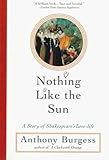 I’m sure Anthony Burgess’s Nothing Like the Sun is like nothing I’ve ever read before. The novel is subtitled A Story of Shakespeare’s Love-life; Burgess’s essential claim is that Shakespeare’s literary genius was borne out of his lust. It’s an interesting thesis, as desire can be quite a motivator, and Burgess manages to convince.
I’m sure Anthony Burgess’s Nothing Like the Sun is like nothing I’ve ever read before. The novel is subtitled A Story of Shakespeare’s Love-life; Burgess’s essential claim is that Shakespeare’s literary genius was borne out of his lust. It’s an interesting thesis, as desire can be quite a motivator, and Burgess manages to convince.
The novel is rich with period detail and dialogue; indeed, it might take some time for the casual reader to become accustomed to Burgess’s use of Early Modern English. For readers familiar with Shakespeare’s sonnets and plays, the novel is a delight of allusions. I found myself wishing I were much more familiar with Shakespeare even than I am, having taught several of his plays (and some of them many times) because I feel sure that some allusions passed me by.
Burgess crafted a plausible, entertaining narrative from the few scraps of information we have about Shakespeare’s life and in the process, held a lens up to Shakespeare’s work and times, exposing both work and times as sublime and filthy at the same time. I would recommend this book highly to anyone interesting in learning more about Shakespeare or about Elizabethan England.
Because I am in a Shakespeare frame of mind, I plan to take a break from the Historical Fiction Challenge and read The Book of Air and Shadows next. As always, I’ll let you know how it turns out.
I just finished Air and Shadows a couple weeks ago and gave away a bunch of promotional copies on my site, too bad we didn't cross path sooner :). I quite liked the book, but it really has almost nothing to do with Shakespeare. The premise is an unknown Shakespearean manuscript, yes, but for the purposes of the plot it could well have been a lost Gospel from the Bible or something (one of the heroes, for instance, is an intellectual property lawyer). If you want more Shakespeare content try Interred With Their bones, which I didn't think was as good on a literary level, but was more the traditional DaVinci thriller, where the people hunting down the Shakespeare manuscript were all Shakespeare authorities, actors, and the like.
http://www.shakespearegeek.com
I recently listened to The Book of Air and Shadows on CD and enjoyed it in that format. I find thrillers lend themselves well to spoken media. Perhaps it harkens back to the old days of listening to The Green Hornet. At the very least, the Bracegirdle letters, which form the backdrop to the main plot, are easier to hear than to read: "Now my father seeyng this taxed us, saying, what shal you not only be idle thyselfe but also tayke my clerke into idlenesse with thee?” It’s a bit like Chaucer, which is more easily understood when read aloud.
In my humble opinion, Air and Shadows is a step up from either of Dan Brown’s two ecclesiastic thrillers, Angels and Demons and The Da Vinci Code, but a far distant second to Carlos Ruiz Zafón’s Shadow of the Wind which is simply the most riveting and beautifully-written literary thriller extant.
Duane and Murray, thanks for the suggestions. I'm not having too much trouble with the Bracegirdle letters, aside from the fact that they don't sound period to me (except in spelling). Have either of you read Dead Man in Deptford?